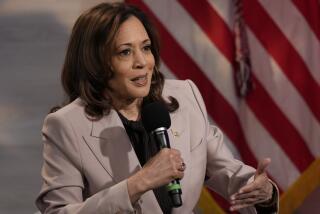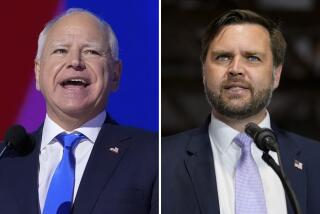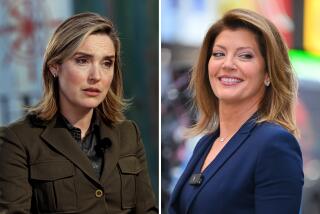Univison proposes debate in Spanish
- Share via
WASHINGTON — Univision, the country’s highest-rated Spanish-language television network and a leading draw for young adult viewers, has invited White House hopefuls from both major parties to participate in the first presidential candidate debates to be conducted entirely in Spanish.
The network has proposed two debates, one for each party, to be held on back-to-back Sundays in September -- giving the candidates unprecedented exposure to a mass audience of increasingly important Latino voters.
The debates, to be held in immigrant-rich Miami, would probably focus on the battle over legalizing millions of undocumented immigrants.
The Democratic candidates tend to back legalization. But the Univision debate could exacerbate a split over the issue among the GOP contenders, further highlighting a divide that party strategists fear might alienate Latino voters, a fast-growing electorate.
On Monday, Sen. John McCain (R-Ariz.), a backer of the legalization measure now before the Senate, used a speech before a mostly Latino audience in Miami to challenge one of his chief rivals, former Massachusetts Gov. Mitt Romney, who has opposed the plan as being soft on illegal immigrants.
Moreover, the Spanish-language aspect of the debate could prove particularly awkward for the Republican field, where all candidates except McCain favor making English the official language of the United States. (On the Democratic side, longshot Mike Gravel, a former senator from Alaska, is the only candidate who supports that proposal.)
It was not clear Tuesday whether the campaigns on either side would accept Univision’s proposal. Officials from several campaigns, deluged with debate proposals from interest groups and media, said they would consider the invitation.
Network officials said they thought the size and importance of the audience would make it difficult for candidates to decline.
Univision is the fifth-most viewed network in the country, behind the major broadcast networks but ahead of English-language cable-TV channels such as CNN, Fox News and MSNBC that have broadcast their own debates. It sometimes beats the broadcast networks in the coveted 18 to 34 age group.
“Many of the issues being discussed in this election season are of particular interest to the Hispanic community,” Univision Chief Executive Joe Uva wrote in a letter to the candidates that was also signed by University of Miami President Donna Shalala, a former Clinton administration Cabinet official on whose campus the debates would be held. “Consequently, we have seen a sharp increase in the number of citizenship applications and voter registrations which we believe will further accelerate the growth of the Hispanic electorate.”
The letter argues that Latino voters could prove decisive in key early primaries -- including California’s and Florida’s -- in addition to deciding the general election in states such as New Mexico, Arizona and Colorado.
The precise format has not been decided. But simultaneous translation would be provided to the candidates and the audience. Of the 18 declared candidates on both sides, only two -- both Democrats -- are known to be fluent in Spanish: New Mexico Gov. Bill Richardson and Connecticut Sen. Christopher Dodd.
The candidates would take questions for 90 minutes from Univision’s evening news anchors, Jorge Ramos and Maria Elena Salinas, who have devoted much of their airtime in recent months to the immigration issue. Their coverage is credited with encouraging thousands of Latinos to attend mass demonstrations protesting a push last year by congressional Republicans to make illegal immigration a felony.
For Univision, the debates would mark a rare foray into presidential politics.
--
More to Read
Sign up for Essential California
The most important California stories and recommendations in your inbox every morning.
You may occasionally receive promotional content from the Los Angeles Times.













